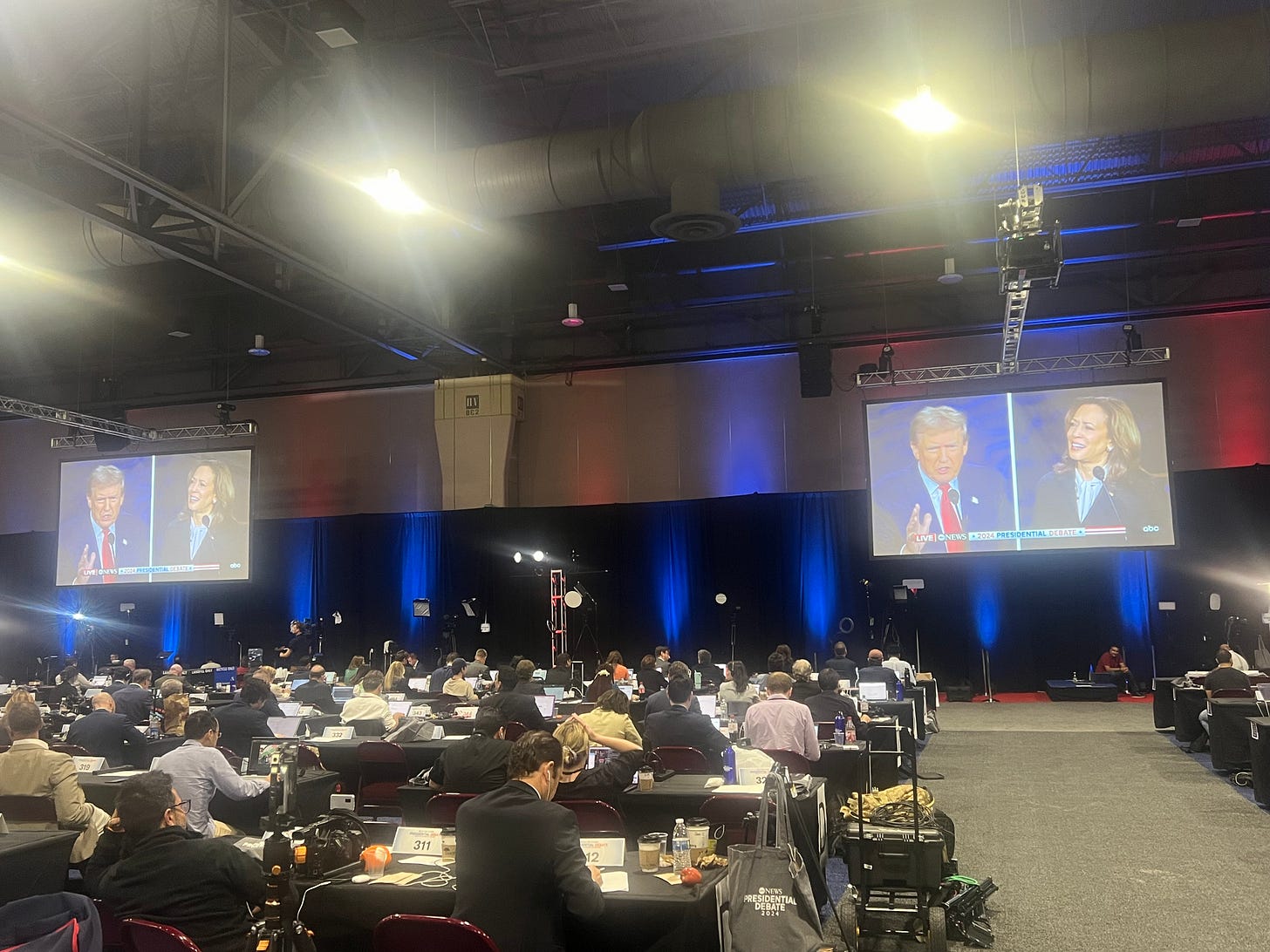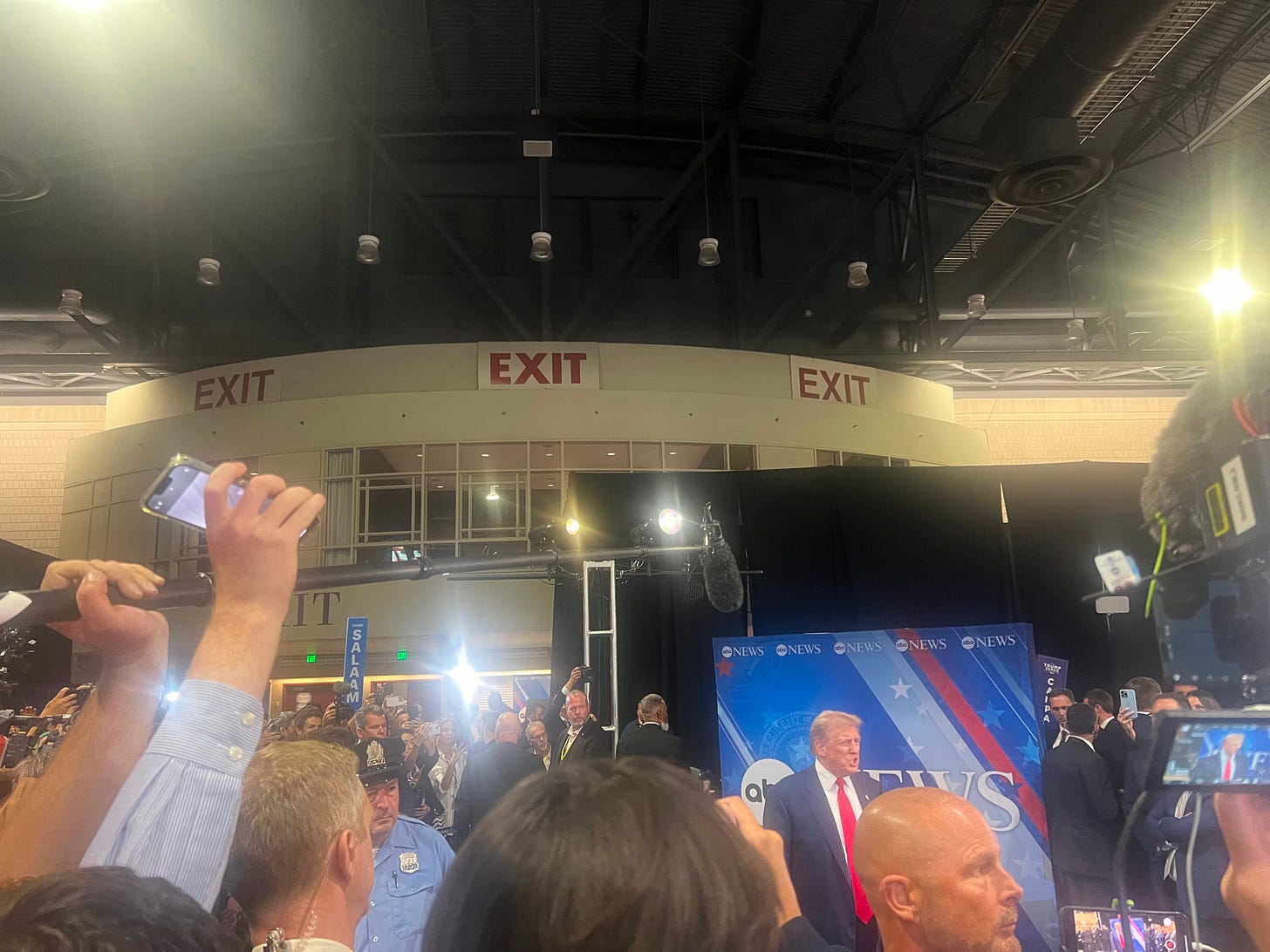How Harris got under Trump’s skin
“She knows what triggers him,” a Democratic congressman told me.

Good morning! I’m reporting to you live from Philadelphia, the site of last night’s debate between Kamala Harris and Donald Trump. I’ll have analysis of the debate below, plus takeaways from my interviews in the Spin Room with surrogates for both candidates.
I’ll have more throughout the week from the debate and Spin Room — including a deep dive tomorrow on an answer that really stuck with me — but wanted to give you a broader overview of the debate first. If you want to hear more analysis from me, I’ll be on NPR’s “1A” from 10-11am Eastern Time. Tune in!
We might like to imagine American presidential debates as grand battles of rhetoric and policy — but, more than anything, they’re television shows. And on TV, it’s the visuals that matter most.
As a result, while there are some debate zingers that echo through history — “There you go again,” “Will you shut up, man?” — it is the candidates’ body language that often ends up emerging as more memorable.
The most famous example comes from the nation’s first presidential debate in 1960, when Richard Nixon appeared pale and sweaty next to a tanned and rested JFK. But George H.W. Bush checking his watch in 1992, Al Gore sighing in 2000, and George W. Bush scowling in 2004 are other members of this pantheon.
Most recently, one didn’t need to turn the sound on to know that Joe Biden lost his debate with Donald Trump in June. Most Americans would probably be hard-pressed to recall much of what Biden said that night, but his visual appearance — his slack jaw, his vacant eyes, his shuffle on and off the stage — was quickly burned into the national memory.
Throughout that night, Trump — a creature of television and acknowledged master of the medium — could be seen grinning next to Biden, clearly enjoying himself as his rival’s candidacy unraveled in real time.
Trump’s glee while facing Biden makes for a stark contrast with the image he presented on the debate stage Tuesday, when — once again — the split-screen told the story of the night.
Kamala Harris, who has been promoted from understudy to play Trump’s opposite, was the one smiling this time, repeatedly laughing and smirking as Trump spoke, silently mocking him with her eyes and mouth. Trump, meanwhile, looked approximately like the “Anger” character in “Inside Out,” seeming to stew in rage as he stared straight ahead for 90 minutes. When it was his turn to talk, his answers often came out fast and loud; per numbers shared with Wake Up To Politics by Roll Call Factbase, Trump spoke more than 20% faster than Harris throughout the night.
In his previous six presidential debates — whether looming behind Hillary Clinton in 2016 or jeering at Joe Biden in 2024 — Trump has not always won, but he has usually seemed dominant and in control. He has been the main character of American politics for upwards of nine years, and the main character on almost every debate stage he’s walked onto. That streak ended Tuesday, as Harris — peering over at Trump, shaking her head with evident amusement — made Trump seem not like a world-historic figure (as Clinton and Biden sought to do), but like someone small. She called him “unserious” at the Democratic convention last month, and she treated him that way on Tuesday.
That visual decision, more than any specific question or response, is how last night’s debate will be remembered.
Of course, Harris did not goad Trump only with her facial expressions.
In fact, her entire strategy for the debate seemed framed around getting under her opponent’s skin, attempting to rattle him. She started the debate by striding over to Trump and introducing herself, something he seemingly didn’t see coming; from there, it was off to the races.
Again and again, whether it was Harris bringing up assessments of his economic plan by experts at the Wharton School (his alma mater) or her claim that “people start leaving his rallies early out of exhaustion and boredom,” Trump took his rival’s bait, reliably taking time out of his answers to respond to her prodding.
It was after his retort about his rally crowds — during an answer that was supposed to be about immigration — that Trump claimed that immigrants in Springfield, Ohio are “eating the pets of the people that live there,” a right-wing rumor with zero evidence.
That was one of several false claims by Trump that ABC’s moderators, David Muir and Linsey Davis, fact-checked throughout the night, along with his insistence that Democratic vice presidential nominee Tim Walz supports “execution after birth” (which he does not) and that “crime in this country is through the roof” (crime is on the decline).
The ABC moderators also repeatedly followed up when Trump did not answer their questions, asking directly whether he had any regrets from January 6th, whether he would veto a national abortion ban if Congress passes one, and if he wants Ukraine to win its war against Russia. (Trump never offered answers to any of those questions.) The moderators much less frequently pressed Harris when she dodged their questions, such as her non-answer on why she no longer wants to decriminalizing border crossings, a position she held in her last campaign for the presidency.

In the Spin Room after the debate — where Harris surrogates easily outnumbered Trump’s representatives — several Republicans heaped blame on ABC’s moderation, a seeming acknowledgement that the night had not gone well for Trump. “I think anybody who watched that — many of you may not admit — would agree that that was not an even-handed treatment at the two candidates,” former Republican presidential candidate Vivek Ramaswamy told reporters.
Several of Trump’s spinners were also reduced to offering qualified praise of his performance. “When it came to issues of core policy, I think Donald Trump won the debate on core policy,” Ramaswamy said. Does that mean he struggled in other areas of the debate? “Look, I think the other areas of the debate—the core policy is the part that best serves the voters,” Ramaswamy told me. “I think a lot of the rest of it was about atmospherics, about vibe—”
I cut him off. But how did he do on those parts? “Those are individual moments,” he responded. “I think those are threads throughout the debate. So I don’t think there was a clear winner when you think about the vibe or the character. I think there’ll be some voters, particularly a lot of independents across the country, who are going to find Donald Trump’s authenticity and lack of scriptedness to be particularly appealing. I think there may be some voters who like Kamala Harris’s vibe who hadn't heard her before, that’s the honest truth.” And then, he circled back: “When it came to questions of core policy, I think Donald Trump came out on top.”
Later, when Sen. Lindsey Graham (R-SC) was asked what he liked about Trump’s performance, he replied: “I think his closing was excellent.” (Indeed, Trump’s closing statement, in which he asked why Harris hadn’t achieved the initiatives she was talking about in her three-and-a-half years as vice president, was one of his most focused answers of the night.)
So why did he wait until the end of the debate to make that point? “Yeah,” Graham told me when I asked that. “I would have hit that harder earlier.” Graham acknowledged to me that Trump allowed several “missed opportunities” to sail by throughout the night.
Meanwhile, Democrats were crowing about Harris’ sucessful needling of her opponent. “She knows what triggers him,” Rep. Robert Garcia (D-CA) told me in the Spin Room, boasting that “he was on the defensive all night” and “clearly mad.” Garcia’s conclusion: “Mission accomplished.”
Every Democrat I spoke to was left hoping that Trump and Harris would square off again — something Trump notably did not commit to during his own turn in the Spin Room (an appearance which itself seemed to acknowledge that the night hadn’t gone his way). “I have to think about it,” Trump said, referring to a second debate with Harris.
By this morning, his answer seemed to have changed. “I am not inclined to do it because I won the debate by a lot,” Trump said in an interview on Fox. “I don’t know that I want to do another debate.”



I thought it was pretty telling when Harris said, “world leaders think you’re a joke.” The only world leader Trump could recall for his defense was Viktor Orban. Trump knows the world thinks he’s a clown, but he doesn’t care - the power of the American presidency forces the world to take him seriously.
I very much appreciate your on-the-site reporting. The details of your experiences combined with your reporting form a picture of how our government works, stumbles and lumbers on - all of which is something I have only observed from afar. It’s quite interesting.
I hoped for more substantive details on her policies but I realized the debate was never going to be where those were presented. She had one goal really, one very important goal, and that was to not let trump control the narrative, to prove she could hold her own when confronted with an extreme narcissist and gleeful bully. She more than proved her ability to do so. This will serve her well when working with and being confronted by other heads of state and our own Congress.
Hopefully she will now release more detailed policy statements. It is time.